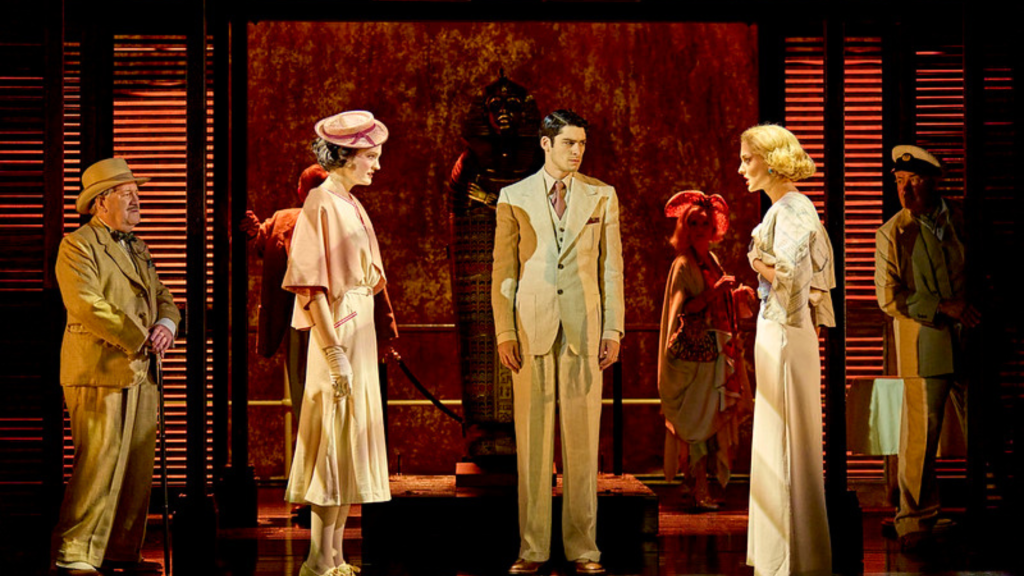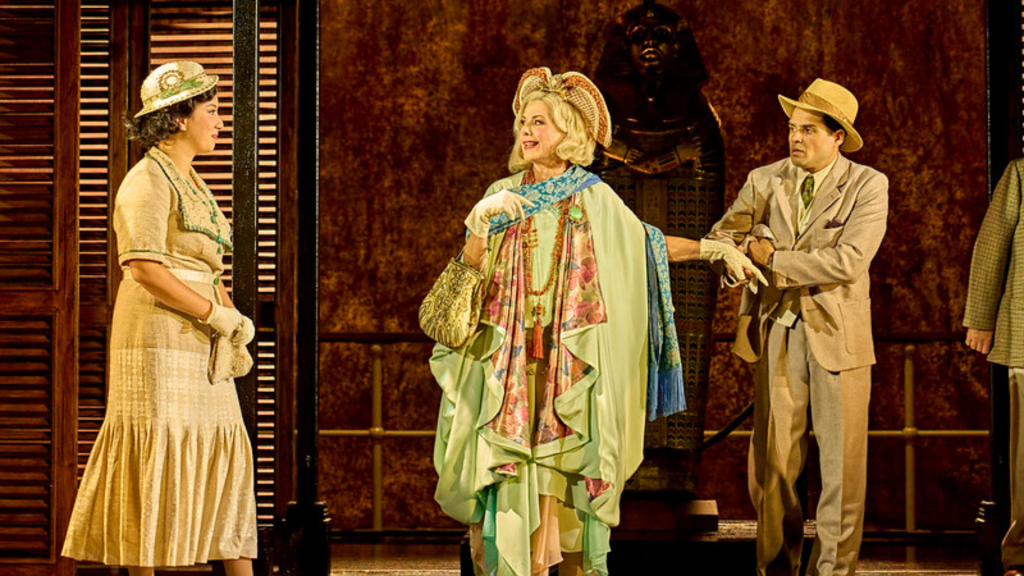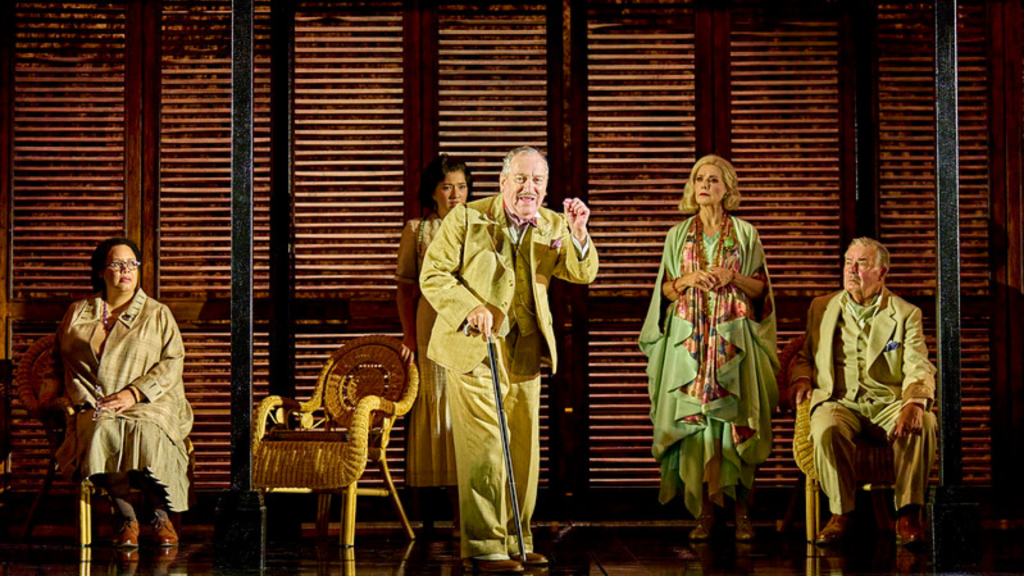
Agatha Christie’s Death on the Nile docked at The Lowry, Salford, delivering murder, suspense, and laughs to a near sell-out audience.
Directed by Lucy Bailey and adapted by Ken Ludwig, the production kept viewers hooked from start to finish.
Cast and Creative Team: Mark Hadfield leads as Hercule Poirot, with Glynis Barber (Salome Otterbourne), Bob Barrett (Colonel Race), Libby Alexandra-Cooper (Linnet Ridgeway), Esme Hough (Jacqueline de Bellefort) and Nye Occomore (Simon Doyle) supporting him. Helen Katamba (Annabelle Pennington), Camilla Anvar (Rosalie Otterbourne), Howard Gossington (Atticus Praed), Nicholas Prasad (Ramses Praed) and Terence Wilton (Septimus Troy) round out the cast.
Mike Britton designs the set, Oliver Fenwick lights the stage, Mic Pool creates the sound world, and Liam Steele directs movement. Fiery Angel produces the show in association with Agatha Christie Limited.
The play’s pacing is a strong asset. The story moves briskly from the Cairo museum to the Nile steamer. Early dialogue mixes menace with humour, as Jackie stalks Simon and Linnet while quipping lines such as “of course I have been following you” and warning Egypt is “the land of revenge.” The audience laughs nervously while recognising the danger.
The play builds tension with Jackie’s standoff, which ends when she shoots Simon in the leg, and with Linnet’s coffin sequence, which fills the theatre with panic. Yet heavy foreshadowing dilutes the mystery. When Simon warns, “She might take a cheap pop shot… I will break her neck,” the audience can predict Jackie’s guilt long before Poirot reveals it.

Colonel Race unexpectedly breaks the fourth wall. Asked to search for the gun, he replies, “I will seek to my errands all in good time,” pausing before returning to the plot. The audience laughs, but the moment jars, hinting at a role bigger than “Poirot’s old friend.”
The acting is spirited, though uneven in tone. Poirot’s opening speech on love sets a thoughtful note, anchoring the play in Christie’s themes of passion, betrayal and heartbreak. Some performances, particularly in scenes of tragedy, felt overly staged, as though trying to capture period mannerisms rather than genuine emotion. This could be a deliberate stylistic choice, but at times it risked pulling me out of the moment.
Jacqueline de Bellefort is one of the most compelling presences on stage with her repeated threats to Linnet raising both laughter and dread. Linnet herself, played with elegance, has standout moments, especially in the coffin sequence, which was one of the most physically gripping parts of the show.
Supporting actors add colour: Katamba’s Annabelle hustles for contracts, Wilton’s Septimus parades about in flamboyant robes, and his quiet confession with Salome creates moments of unexpected lightness.
Some dynamics felt forced. The chemistry between the mother and daughter characters in the museum was unconvincing, while Jackie and Simon repeating the same poetic image of the sun and moon in separate scenes came across as contrived rather than romantic.
Lucy Bailey directs with flair and invention. She uses a moving bed to create unease in Linnet’s scene and employs silent tableaus, like the doctor and his wife holding hands in an eerie spotlight, to build atmosphere without words. While humour and fourth-wall breaks sometimes weaken suspense, they fit Poirot’s dry wit.
The set is at its most convincing in the opening museum sequence, where the detail immediately grounds the story. Once on the steamer, the setting is less obvious until the reveal of a balcony makes it clearer.
Lighting and sound design are key strengths. The production opens with a roar of the ship’s engine in darkness, emphasising the importance of the steamer. Cold white light signals night, while warmer colours and spotlights mark shifts in tone.

The music does much of the heavy lifting: Egyptian street music, bird calls, and crickets immerse the audience in place, while suspenseful musical cues during confrontations add to the tension.
The Lowry audience responded with energy. They laughed consistently at Poirot’s wit and gasped when Linnet was shot at the end of Act I. After a brief silence, they broke into applause. By the finale, the ovation was sustained and enthusiastic. Engagement never faltered, even though the mystery lacked surprise.
I arrived at The Lowry an hour before curtain, collected my ticket and programme quickly, and joined a busy foyer. With some knowledge of Egyptian mythology, I looked forward to seeing how the production would use it. After a drink at the bar, I entered a packed auditorium.
The production highlights Christie’s central themes of love, jealousy, betrayal and revenge. Poirot’s speech on love and Jackie’s pursuit of Simon and Linnet drives the passion. Age and promise are also noted, lines like “A woman of infinite promise” underline themes of wasted potential and tragedy.
References to Egyptian mythology and gods add atmosphere but never develop into central ideas. A playful mention of Chanel No. 5 perfume earns laughs but momentarily breaks the 1930s illusion.
A bold, funny and atmospheric production, with enough theatrical flair to keep the audience enthralled from start to finish.
★★★★☆